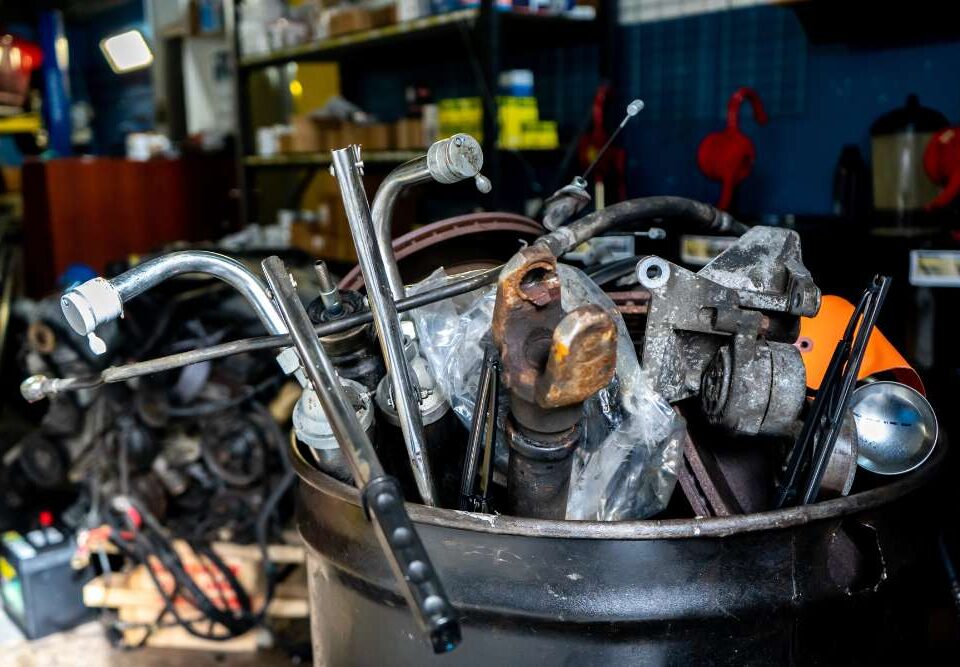
How Eco-Friendly Junk Removal Helps with Recycling and Waste Management
September 24, 2025
The Environmental Importance of Donating Your Junk Items
September 24, 2025What to Know About E-Waste Disposal and Its Environmental Impact
Every year, households and businesses discard countless electronic devices, from outdated cell phones to broken computers and unused appliances. While many see these items as simple clutter, they carry far greater consequences if not properly disposed of. Electronic waste, or e-waste, contains hazardous materials like lead, mercury, and cadmium, which can severely harm the environment when left to decay in landfills. At the same time, these discarded devices also hold valuable metals and components that can be recovered and reused. Understanding the importance of responsible e-waste disposal reveals how essential it is to protect both the planet and human health.
The Growing Volume of Global E Waste
Electronic waste is one of the fastest growing waste streams in the world today. As technology continues to advance at lightning speed, devices that were cutting edge just a few years ago quickly become obsolete. Consumers replace phones, laptops, and televisions more frequently, creating an overwhelming flow of discarded gadgets that often ends up in landfills or incinerators.
This rapid turnover poses a major environmental concern. Without proper systems to handle the growing piles of e-waste, the risk of soil contamination, air pollution, and water poisoning increases dramatically. Communities everywhere are grappling with this challenge as outdated electronics accumulate faster than recycling programs can expand. Addressing this issue requires coordinated efforts between individuals, businesses, and governments to prioritize proper e-waste disposal. By confronting the rising tide of electronics, society can prevent an ecological crisis while capturing valuable materials that would otherwise be wasted.

The Hidden Toxins Inside Discarded Electronics
Many people view electronics as harmless once unplugged, but their inner components often contain dangerous toxins. Lead from old monitors, mercury in switches, cadmium in batteries, and brominated flame retardants in plastic casings are just a few examples of substances found in common gadgets. When dumped irresponsibly, these toxic elements seep into the soil and groundwater, harming plants, animals, and humans alike.
Even more concerning, when e-waste is burned or left exposed to the elements, hazardous fumes can enter the atmosphere, contributing to long-term health problems in nearby communities. These dangers highlight why e-waste must never be treated as ordinary trash. Instead, safe handling, dismantling, and recycling practices are needed to protect ecosystems and public health. Recognizing the hazards hidden in outdated devices reminds us that responsible disposal is not a luxury but a necessity for ensuring cleaner and healthier environments for present and future generations.
Why Recycling Electronics Saves Valuable Resources
While e-waste poses environmental threats, it also presents valuable opportunities. Electronics contain metals like gold, copper, silver, and aluminum that can be recovered and reused. Recycling these materials not only conserves natural resources but also reduces the need for energy-intensive mining. For example, extracting gold from old circuit boards uses far fewer resources than mining it from ore deep underground.
The potential of recycling extends beyond metals. Plastics from casings, glass from screens, and even small components can be repurposed into new products, reducing the strain on manufacturing industries. By treating e-waste as a source of raw materials, recycling helps build a circular economy where waste becomes a resource rather than a burden. This approach saves energy, lowers greenhouse gas emissions, and ensures that valuable resources are not lost forever in landfills. Recycling electronics is a practical step toward environmental conservation and economic efficiency.
The Role of Businesses in E Waste Management
Businesses generate vast amounts of e-waste through outdated office equipment, servers, and other devices. Unlike households, which discard electronics sporadically, companies often replace large numbers of devices at once during upgrades or relocations. This bulk disposal amplifies the importance of responsible e-waste management in the corporate world.
When businesses partner with professional junk removal and recycling services, they ensure that electronics are handled according to environmental standards. Proper disposal not only prevents harmful toxins from entering the environment but also strengthens corporate responsibility and reputation. Companies that adopt sustainable practices demonstrate leadership in environmental stewardship, often appealing to eco-conscious clients and partners. Beyond image, responsible e-waste management can even reduce costs through resource recovery. Businesses hold a critical role in curbing the e-waste crisis, proving that sustainable disposal practices can align seamlessly with operational efficiency and community responsibility.
The Impact of E Waste on Human Health
Improper e-waste disposal does not only harm the environment; it directly affects human health. Communities near landfills or informal recycling sites are especially vulnerable. When toxic metals leach into water supplies, people can experience severe health problems such as neurological damage, respiratory issues, and developmental delays in children.
Exposure to fumes from burning e-waste, often seen in unregulated disposal areas, introduces heavy metals and chemicals into the air. This pollution can cause chronic illnesses and weaken immune systems. Even workers in unsafe recycling operations face daily risks as they dismantle electronics without protective gear. The health implications of mishandled e-waste underline why proper disposal and recycling must be prioritized. By ensuring safe processing, communities not only protect the environment but also shield themselves from long-term health crises. Recognizing these dangers should inspire greater urgency in adopting sustainable e-waste management solutions worldwide.
The Economic Benefits of Proper E Waste Disposal
Recycling e-waste is not only about protecting the planet—it also provides significant economic opportunities. Extracting valuable metals from discarded electronics reduces manufacturing costs for industries that rely on raw materials. This cost efficiency supports production while lowering reliance on expensive imports of mined resources.
Additionally, the recycling industry creates jobs in collection, sorting, dismantling, and processing, providing meaningful employment opportunities in local communities. E-waste recycling also encourages technological innovation as companies invest in advanced methods to improve recovery rates and reduce environmental harm. Economically, this fosters a cycle of growth that balances sustainability with profitability. Communities that embrace recycling not only save money but also generate revenue by turning discarded devices into marketable materials.
The Importance of Consumer Awareness in E Waste Disposal
Consumers play a vital role in shaping how e-waste is managed. Many people still dispose of old electronics with regular trash simply because they are unaware of the risks or lack convenient recycling options. Increasing awareness about the hazards of improper disposal and the benefits of recycling is essential to changing these habits.
Educational campaigns, community recycling events, and partnerships with junk removal services can help bridge the gap between awareness and action. When consumers understand that their old devices can be responsibly recycled rather than wasted, they are more likely to participate in sustainable practices. Small individual efforts collectively make a huge impact when communities adopt responsible disposal methods. Empowering consumers with knowledge transforms them into active participants in environmental protection.
How Junk Removal Services Simplify E Waste Recycling
Managing e-waste on your own can feel overwhelming, especially when devices contain hazardous components that require special handling. Junk removal services simplify this process by providing safe, efficient, and environmentally responsible solutions. These professionals know how to sort, transport, and deliver electronics to certified recycling facilities.
By relying on expert services, households and businesses avoid the risks of improper disposal while contributing to broader sustainability goals. Junk removal providers ensure compliance with environmental regulations, giving clients peace of mind that their electronics are managed responsibly. They also save time and effort by handling the heavy lifting and logistics. With professional support, e-waste recycling becomes accessible to everyone, removing barriers that often discourage proper disposal. This streamlined approach ensures that more devices are recycled rather than wasted, helping communities move closer to reducing their overall environmental footprint while supporting long-term waste management strategies.
The Role of Legislation in Controlling E Waste
Government regulations play a crucial role in guiding e-waste disposal practices. Many regions have introduced laws requiring safe handling of electronics, banning certain items from landfills, and mandating recycling programs. These policies are designed to protect public health and encourage responsible waste management.
Legislation also holds businesses accountable for the life cycle of their products, pushing manufacturers to design electronics that are easier to recycle. Some governments even offer incentives for companies and consumers who adopt sustainable disposal practices. These legal frameworks ensure that responsibility for e-waste is shared across industries and communities. By enforcing strict standards, legislation reduces environmental risks while encouraging innovation in recycling technologies. Strong policies act as the backbone of effective e-waste management, creating systems that balance environmental responsibility with economic growth.
Building a Sustainable Future through Responsible E Waste Disposal
Addressing the e-waste crisis is not only about solving today’s problems but also about preparing for tomorrow. As technology continues to evolve, the volume of electronic devices will only increase. Without proactive solutions, the risks to the environment and human health will escalate. Responsible e-waste disposal ensures that future generations inherit a world with cleaner air, safer water, and preserved resources.
By prioritizing recycling, communities reduce dependency on raw material extraction, cutting energy use and emissions. Individuals, businesses, and governments must work together to build a sustainable system where electronics are treated as renewable resources rather than disposable items. This vision of sustainability transforms waste into opportunity, encouraging growth while protecting the planet. Responsible e-waste management is a critical investment in the future, offering a pathway to a healthier environment and stronger economies.
Conclusion
E-waste has emerged as one of the most pressing environmental challenges of our time, but it also offers opportunities for meaningful change. Proper disposal and recycling of electronics protect communities from toxic exposure, conserve valuable resources, and reduce the pressure on landfills. By embracing sustainable practices, households and businesses alike contribute to building cleaner, healthier environments. For those looking for a reliable partner in managing electronic waste, North Bay Junk Removal provides expert services tailored to meet these needs. Based in Santa Rosa, CA, their team specializes in responsible junk removal solutions that prioritize recycling and sustainability. With years of experience, they make it simple to dispose of electronics safely while minimizing environmental impact. To schedule a service or learn more, call 707-478-6817. Choosing responsible junk removal is more than convenience—it is an investment in a greener, more sustainable future for everyone.




